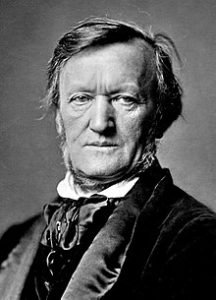
BY NECDET BALKIR GÖKA (ME/IV) balkir.goka@ug.bilkent.edu.tr
In 2013, German artist Stephan Balkenhol completed a monument commissioned to celebrate the 200th birthday of Richard Wagner, one of the most influential composers of the 19th century. This sculpture is fascinating because although Wagner is represented with the dimensions of a normal human, a huge dark shadow looms behind him. This shadow represents the influence of Wagner on Hitler and the Third Reich. It is well known that Hitler was a great fan of Wagner’s music. He owned the manuscript score of the composer’s first successful opera, “Rienzi,” which is thought to have been destroyed in the bunker where Hitler met his death. Also, some believe that Wagner, through his works, inspired Hitler’s anti-Semitic and racist ideas, given the latter’s obsession with the composer. Indeed, Wagner’s anti-Semitism is very well known; for example, he published a racist essay titled “Jewishness in Music,” in which he made the claim that the Jewish artist “can only speak in imitation of others, make art in imitation of others, he cannot really speak, write or create art on his own.” To understand the influence of Wagner on Hitler in more detail, we must look more closely at Wagner’s music.

Richard Wagner is best known for his operas. Unlike most other composers, he wrote both the libretti (plural of “libretto,” the text of a work for the musical theater) and the music himself. His compositions are notable for their complex textures and rich harmonies, as well as their use of leitmotifs. Leitmotifs – musical phrases associated with a person, place or idea – are important elements in Wagner’s operas. There is no limit to the number of leitmotifs that can be used in a work; for example, Wagner employed hundreds of them in “Der Ring Des Nibelungen,” a cycle of four operas.
He also approached opera not solely as music but as a “Gesamtkunstwerk” (total work of art). In his essay “The Artwork of the Future,” Wagner defines Gesamtkunstwerk as the unification of various arts, including music, song, dance and poetry. Therefore, his operas are not only musically complicated, but also involve many different supporting elements on the stage, which is one reason why his works have been influential. However, not all stages are capable of accommodating such enormous musical and theatrical productions. For this reason, Wagner designed his own opera house, the Bayreuth Festspielhaus, which is dedicated to the performance of his operas only.
Aside from his music, Wagner was a prolific writer; his essays, articles and other writings cover a variety of topics, from politics and philosophy to autobiography and detailed analysis of his operas. However, many of his writings about music and politics are controversial, because they contain radical ideas like those in “Jewishness in Music.”
Because of its associations with anti-Semitism and Hitler, Wagner’s music is shunned by some, and generally considered taboo in Israel. Woody Allen jokes that he can’t listen to it because it makes him want to conquer Poland.
Yet although Wagner had incredibly horrifying ideas concerning Jews and Judaism, we cannot assume that they were the only underlying reason for the holocaust, and we cannot blame Wagner for the influence he had on Hitler after his death. During his lifetime, his operas attained great popularity and success, but most people’s sympathy toward his extreme ideas decreased over time. Still, not listening to Wagner because of his ideas causes one to miss hearing music that is perfectly composed and greatly influential. Therefore, a person who loves opera and classical music really has to listen to Wagner’s music.
